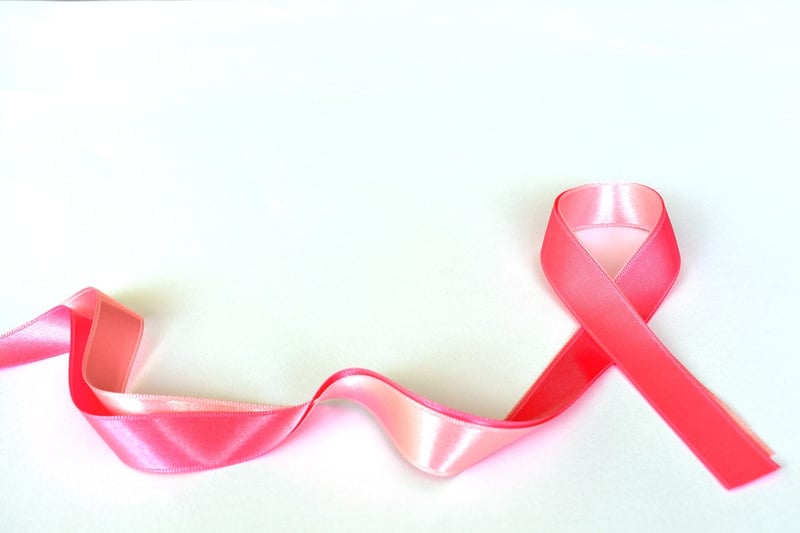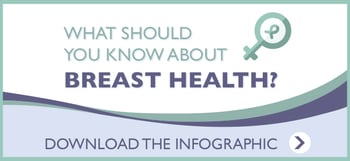 Breast Cancer Risk
Breast Cancer Risk
Breast cancer affects hundreds of thousands of women in the U.S. each year. On average, a woman has approximately a 1 in 8 chance of developing breast cancer during her lifetime and a 1 in 38 chance of dying from it. The American Cancer Society estimates that among women in the U.S., 268,600 new cases of invasive breast cancer and 62,930 cases of carcinoma in situ will be diagnosed, and 41,760 women will die of breast cancer in 2019 alone.[1] Facts like these highlights the importance of taking steps to prevent breast cancer as well as identifying and treating breast cancers that do develop as early as possible.
Breast Cancer Prevention
Fortunately, there are several things you can do to reduce your chances of getting breast cancer. The World Cancer Research Fund estimates that 20% of cancers diagnosed in the U.S. are related to lifestyle factors such as body fat percentage, level of physical activity, alcohol consumption, and/or nutrition, making them preventable.[2] Follow these tips to lower your risk of breast cancer.
Get proper nutrition.
The American Cancer Society publishes guidelines for nutrition to help people reduce their cancer risk. These include
- Limiting red and processed meats
- Eating at least 2 ½ cups of fruits and vegetables per day
- Choosing whole grains over refined grain products[3]
Get moving.
The American Cancer Society recommends that adults get at least 150 minutes of moderate exercise or 75 minutes of vigorous exercise per week and to limit the amount of time spent sitting. Staying active helps to maintain a lean body weight and reduce the risk of a wide range of health problems, including several types of cancer, cardiovascular disease, diabetes, and osteoporosis.[4]
Maintain a lean body weight.
The CDC reports that being overweight or obese after menopause is associated with an elevated breast cancer risk. Additionally, recent research indicates that breast cancer risk is higher in women with higher proportions of body fat, even when their BMI is within the normal range.[5]
Limit use of alcohol.
An analysis of 53 studies showed that a woman’s relative risk of breast cancer increases by about 7% for each alcoholic drink she consumes per day. Women who consumed 2–3 drinks per day had a 20% higher breast cancer risk compared to women who did not drink alcohol.[6]
Avoid tobacco.
Tobacco smoking is linked to higher breast cancer risk, particularly in younger women, and it can also lead to increased complications from breast cancer treatment.[7] Further, studies show that women who continue to smoke after breast cancer diagnosis die at higher rates than breast cancer patients who have never smoked.[8]
If you have the opportunity, breastfeed.
Studies show that women who breastfeed have a somewhat lower risk of developing breast cancer than mothers who don’t breastfeed, and more total breastfeeding time results in a greater reduction in risk.[9]
Early Detection
Fortunately, breast cancer screening has improved in leaps and bounds over the past decades, so more women than ever are able to access early treatment, increasing their odds of survival while reducing the level of treatment necessary.
3-D Mammography
Breast tomosynthesis, better known as 3-D mammography, has made breast cancer screening more effective, increasing the detection of invasive cancers while reducing the number of patients who must be called back for additional testing. Notably, tomosynthesis has produced the greatest increase in cancer detection for women with dense breast tissue.[10] Like breast tumors, dense breast tissue appears white on mammography images, making it much more challenging to identify cancers in these women. At the same time, dense breasts are associated with a higher risk of breast cancer, making it more important for these women to have access to accurate screening.[11]
Abbreviated Breast MRI
Abbreviated breast MRI is a new enhanced breast cancer screening option that’s ideal for women with dense breast tissue and less than a 20% lifetime risk of breast cancer. Women at or above a 20% breast cancer risk are advised to undergo high-risk MRI for breast cancer screening, but MRI screening technology has only recently become available to women at lower risk. If you’re unsure of your personal risk, you can calculate your breast cancer risk here.
The abbreviated MRI exam is much quicker and less costly to perform than high-risk MRI while providing a similar level of accuracy in breast cancer detection,[12] making the most powerful breast cancer screening tool available to more women who could benefit from it. While tomosynthesis has been found to increase the detection of invasive cancer by 1 to 1.3 cancers per 1,000 women,[13] supplemental MRI screening has been shown to detect an additional 15.5 cancers per 1,000 women who had normal mammogram results.[14]
Iowa Radiology offers the most advanced breast cancer screening available, including high-risk and abbreviated breast MRI. Abbreviated breast MRI is not yet covered by insurance, and the cost at Iowa Radiology is $449, due at the time of service. Because of its proven superiority over older mammography technology, our standard of care is to perform only 3D mammograms. To learn more about general breast health, download our free infographic.
Sources
[1] How Common Is Breast Cancer? Cancer.org. https://www.cancer.org/cancer/breast-cancer/about/how-common-is-breast-cancer.html. Updated January 8, 2019. Accessed September 5, 2019.
[2] Diet and Physical Activity: What’s the Cancer Connection? Cancer.org. https://www.cancer.org/cancer/cancer-causes/diet-physical-activity/diet-and-physical-activity.html. Updated April 13, 2017. Accessed September 5, 2019.
[3] ACS Guidelines for Nutrition and Physical Activity. Cancer.org. https://www.cancer.org/healthy/eat-healthy-get-active/acs-guidelines-nutrition-physical-activity-cancer-prevention/guidelines.html Updated April 13, 2017. Accessed September 5, 2019.
[4] Ibid.
[5] Cohut, Maria. Medical News Today. Breast Cancer: Body Fat, Not Weight, Poses Major Risk. https://www.medicalnewstoday.com/articles/320753.php. Published January 29, 2018. Accessed September 5, 2019.
[6] Alcohol. Komen.org. https://ww5.komen.org/BreastCancer/DrinkingAlcohol.html. Updated January 9, 2019. Accessed September 5, 2019.
[7] Smoking. Breastcancer.org. https://www.breastcancer.org/risk/factors/smoking. Accessed Sept. 5, 2019.
[8] Study: Smoking Linked to Shortened Breast Cancer Survival. Cancer.org. https://www.cancer.org/latest-news/study-smoking-linked-to-shortened-breast-cancer-survival.html. Published February 9, 2016. Accessed September 5, 2019.
[9] Breastfeeding. Komen.org. https://ww5.komen.org/BreastCancer/NotBreastfeeding.html. Updated December 10, 2018. Accessed September 5, 2019.
[10] Rafferty EA, Durand MA, Conant EF, et al. Breast Cancer Screening Using Tomosynthesis and Digital Mammography in Dense and Nondense Breasts. JAMA. 2016;315(16):1784-1786. http://dx.doi.org/10.1001/jama.2016.1708. Accessed September 5, 2019.
[11] Ibid.
[12] Mann, RM, van Zelst, JCM., Vreemann, S, et al. Is Ultrafast or Abbreviated Breast MRI Ready for Prime Time? Curr Breast Cancer Rep. 2019;11(1):9–16. https://doi.org/10.1007/s12609-019-0300-8. Accessed September 5, 2019.
[13] Rafferty EA, Durand MA, Conant EF, et al. Breast Cancer Screening Using Tomosynthesis and Digital Mammography in Dense and Nondense Breasts. JAMA. 2016;315(16):1784-1786. http://dx.doi.org/10.1001/jama.2016.1708. Accessed September 5, 2019.
[14] Kuhl CK, Strobel K, Bieling H, et al. Supplemental Breast MR Imaging Screening of Women with Average Risk of Breast Cancer. Radiology. 2017;283(2): 361–370. http://dx.doi.org/10.1148/radiol.2016161444. Accessed September 5, 2019.


